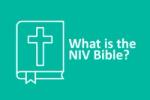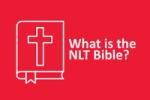Q&A with Matthew Porter about Overflow
The Editor
Q&A with Matthew Porter about his brand new book that explores God's overflowing grace and what the Church can learn from it.

The title of your book Overflow evokes a striking image. Can you explain the concept behind it? What is it that you hope churches will overflow with?
God does not pour out his Spirit just to benefit us. His presence is meant to overflow to others, impacting individuals, churches and society. Such is his generous love – his grace – that is undeserved, unconditional and unending. So, at the heart of my new book Overflow is the idea that the Lord wants churches to impact their locality and region: in word and Spirit, in love and compassion, in prayer and worship, in evangelism and social action, in new initiatives and church planting. So, I’m hoping this book encourages readers and raises expectation that God can work in their church, in their locality and in their region. In these days when there’s much talk of resource churches, the book identifies the Antioch church as a great example of an overflowing church that impacted its region and makes many suggestions of what we can learn today.
When writing this book, what audience did you have in mind?
Overflow is for anyone concerned for the life, health and growth of local churches. It includes some reflections of what we’ve been learning at The Belfrey and so will be of interest in the current debate of what it means to be a resource church. It will be of particular help to church leaders, staff teams, church council members and small group leaders.
Do you think there are any misconceptions about evangelism and church planting in our modern society? Do you hope to alter people’s viewpoints on these topics?
I think most people outside of church are pleased to have a vibrant church in their community that’s making a real difference. They have no interest in evangelism or church planting, but followers of Jesus should be interested in those things – because there’s little or no growth and social impact unless we’re doing the basics of evangelism and discipleship, as well as leadership development and church planting. Those things are not novel and are not especially difficult to do, but we easily get distracted from doing them by many other seemingly urgent things. That’s why Overflow encourages us to do a few things well, to lift our eyes to see the gracious love and generous resources of our good Father, and discover that it’s through giving that we receive, so we can give again and again and again.
.jpg)
How did you come to focus on the resource church of Antioch? Does this topic hold any particular significance for you?
I’ve read the Acts of the Apostles many times, and I’ve often found myself intrigued by the Antioch church. That church fellowship started with small beginnings and at first it didn’t especially look like much was happening, which was my experience when I first became leader of a church. But the church in Antioch then grew as people shared the good news of Christ and it became a church full of the Holy Spirit that loved to worship and welcomed God’s prophetic word. I like that. It was a disciplined church, committed to fasting and prayer. That’s something I’ve always tried to encourage in the churches I’ve led. And it was from this church that so many other churches were planted not just in their locality but also in the surrounding region. This is what we’re wanting to do through The Belfrey. Barnabas and Saul gave Antioch great leadership, and brought on new leaders, which I now see as essential. But most importantly the Antioch church is an example of the wonderful overflowing work of the Holy Spirit. So, there’s so much to learn from this church – not just about church life but about God himself - the God of overflow.
What does Overflow add to the conversation on resource churches?
There’s much talk of resource churches today, but little has been written. Resource churches are churches that have not just a local but a regional vision. They exist to impact well beyond themselves, and normally a big part of this includes church planting. In Overflow I suggest there are at least seven such resource churches in the New Testament, of which Antioch was one of the most important. What’s noteworthy is that all are commended for their generosity, which reminds us that giving away is at the heart of being a resource church. At The Belfrey in York where I’m Vicar, we’ve sought to do this for a number of years, but we still have so much to learn! What we’ve discovered is that there’s no church planting without leadership development, no leadership development without discipleship, and no discipleship without evangelism. That’s why these four themes of evangelism, discipleship, leadership and planting have become central to our resource church strategy.

Evangelism is simply telling people about Jesus. As we’re amazed by the person of Christ so his love and good news overflows from us. Discipleship is the daily practice of following Jesus and learning to be Christ-like in every context of life. Leadership development is about intentionally raising up and empowering others to take a lead in all sorts of areas of life, including church. And church planting is about sending a leader and team to revitalise an old church or start a new one.
How does your book differ from other titles on the topic?
As well as telling a little of The Belfrey’s story, the book provides an interesting synthesis of some current thinking and practice in a number of areas. So, it’s about resource churches - although there’s little written on the subject to date, so it’s part of the initial conversation. It’s about church planting - recognising this is key to the future of the church. It’s also about the five-fold ministry of apostles, prophets, evangelists, pastors and teachers - all five of which were at work in the church of Antioch and which are helpful when considering leadership in churches of overflow today. It’s also about the nature of God - who is supremely generous and provides unending resources for us to fulfil his mission. The book also ends by asking what would happen if in the coming years we planted churches that plant churches – creating a church planting movement of overflowing churches. So, the book provides an integration of understanding, bringing together resource church and church planting thinking, with a Foreword written by John McGinley (head of Church Planting at New Wine), along with ideas from Alan Hirsch on five-fold ministry and Steve Addison on movements. I hope it’s a fascinating and thought-provoking read!
As a church leader yourself, how do you implement the principals of the resource church in your own ministry? Do you ever feel challenged in this venture?
I’ve tried to help create a resource church culture at The Belfrey and lead in the light of that. This all starts with giving. In my book A-Z of Prayer there’s a chapter about kenosis - which is a Greek word which means emptying myself of myself, so I can be filled with the Spirit and serve selflessly. Paul says in Philippians 2 that Christ perfectly modelled this by ‘making himself nothing, taking the very nature of a servant.’ So Christian leaders in every sphere should always be servant leaders, pouring out their lives into others – and I’ve always sought to do this, in every church I’ve led. What’s different about leading a resource church is that I need to do this in a much more focussed way, ensuring our strategic emphases are central. In particularly I need to use my time, energy and resources well, especially investing in people, ensuring the team is healthy and has a good mix of the five-fold gifts. I especially need to develop leaders – which is often the missing piece for many churches.
It’s an honour to do my job. It’s rewarding, hard work and always challenging!
Your book Overflow follows a different structure to your previous A-Z titles; how did you find this writing experience by comparison?
I really enjoyed writing the A-Z titles with chapters that aren’t long and content that’s simple. They aim to provide an introduction to subjects like discipleship and prayer, and they’re intentionally short and sweet, rather like some of the blogs I write. I hope to write more A-Z’s in the future! Overflow however is different. Chapters are longer and it’s not particularly written with new believers in mind. So, this book took a bit longer, and also required more reflection. I was also aware that for all the good things about The Belfrey and the encouraging stories that I share, we’re still very much a work-in-progress! There are many churches with more experience of overflow than us. So, I wanted to make sure that I wasn’t presenting us as having everything right - which I hope I’ve managed to do in the book.
In the modern church, some of the five-fold ministries have diminished; why do you think that all five roles are essential for a successful church?
I agree with Alan Hirsch, that Paul’s description of apostles, prophets, evangelists, pastors and teachers is very important for ministry in the New Testament and should be central to churches seeking to be missional today. These five roles and gifts reflect Jesus, who as the ‘anointed one’ is anointed by the Spirit to be great apostle, great prophet, great evangelist, etc. I’m convinced that Christ continues to give these gifts to the church today, so we need to be encouraging them in our leaders and others too. Like so many, I’ve been really helped by Alan’s teaching and am honoured that he’s written an endorsement of Overflow.
You regularly quote the Bible in Overflow; did you discover anything new about the Scriptures as you wrote this book?
When researching for a book, I always learn lots! One thing that stood out through Bible study is that all seven of the resource churches that I identify in the New Testament are all separately commended for their generosity. When I saw that, it reiterated for me the fact that giving is, and always needs to be, at the heart of resource churches.
The churches in Acts often had dramatic encounters with the Holy Spirit; can you give us a memorable example of such an experience in your own church?
Monday mornings is one of my favourite times at church, as the staff gather and share what’s happened over the past week and weekend. There are normally fantastic stories of people encountering the Lord and being transformed. I mention a few in Overflow. Here’s one I heard about today, relating to prophecy – something that was important to the Antioch church, and to us at The Belfrey: A few months ago someone visited our church who in the past had felt God call them to serve in Brazil at some point in the future. However, they’d now doubted this call for lots of reasons and were about to give up on the idea. In this particular Communion Service they attended, I’d encouraged those present to ask God for something when they held out their hands to receive the bread and wine. So, this person asked God to speak to them about Brazil, if it was still on his agenda. When they returned from Communion, someone from our church approached them and said, ‘I have a word for you. It’s Brazil. I don’t know if that means anything to you.’ They were so encouraged, and recently wrote to us, telling us this story, and saying how they were now preparing again for Brazil!
What do you hope that readers will take away from this book?
I regularly come across Christians who have little or no expectation that people come to faith any more, or that God speaks, or heals or provides. But the Bible presents a God of overflowing grace. So as well as getting to know the Antioch church and seeing things we can all learn, probably the main thing I hope readers will take away is a renewed perspective on the abundant resources that God not only possesses but also freely gives to those who ask and will give them away.
In three words, how would you describe Overflow?
Hopeful. Visionary. Prophetic.
Overflow: Learning from the inspirational resource church of Antioch in the book of Acts by Matthew Porter (Authentic Media) is available to order today.
Latest Blogs

Bible
What is the New International Version (NIV) Bible?
Finding the right Bible isn’t easy. There are dozens of translations and hundreds of editions to choose from. Our new series of guides is here to answer your questions about the different Bibles on offer today.

Bible
What is the English Standard Version (ESV) Bible?
Finding the right Bible isn’t easy. There are dozens of translations and hundreds of editions to choose from. Our new series of guides is here to answer your questions about the different Bibles on offer today.

Featured
What is the King James Version (KJV) Bible?
Finding the right Bible isn’t easy. There are dozens of translations and hundreds of editions to choose from. Our new series of guides is here to answer your questions about the different Bibles on offer today.

Featured
What is the New Living Translation (NLT) Bible?
Finding the right Bible isn’t easy. There are dozens of translations and hundreds of editions to choose from. Our new series of guides is here to answer your questions about the different Bibles on offer today.

Bible
Choosing The Right Bible
With more than 20 English Language translations each available in 25 or more different editions the choice of Bibles excites and bewilders. Choosing the right Bible for you is important - even if you already have more than one.

Spiritual Growth
LENT COURSES - How to choose the right one for you
Long overshadowed by the celebrations of Easter Sunday, Lent is being rediscovered as a sacred time of reflection and renewal in its own right and a time of preparation for the joyous seasonal finale.
